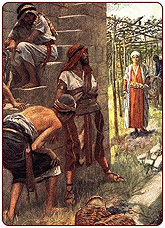 by William Sullivan –
by William Sullivan –
The left is desperate to coerce Americans into embracing the president’s platform of increasing taxes on the wealthy to redistribute to the downtrodden, slothful, and all those between who stand to collect. So Charlie Rangel appealed to a largely Christian nation, “What would Jesus do?”
The hypocrisy here is so obvious that it need not be discussed in detail. Suffice it to say, when and where progressives draw the line on Christian influence in legislation tends to compromise any faith they claim to have. Asking this question about the current budget debate but not about, say, the morality of tax dollars serving to mutilate and siphon unborn babies from their mothers’ wombs is suspicious to say the least. If conservatives cite Christ’s teaching to protect unborn lives from a progressive agenda that indiscriminately allows for their destruction, it is panned as the archaic ravings of crackpots. Yet when Christ is referenced as a template of charity to advance the progressives’ redistributive agenda, nothing could be more pertinent to American values.
So sure, Rangel is a hypocrite. And sure, the hypocrisy is double-thick given his tax evasion. But let’s just try to answer his question. Charlie wants to know, how would Christ really feel about the rights of a private property owner, and wouldn’t He be for a governmental system that forces wealth from the hands of the wealthy to pay for the lowly masses less fortunate than he?
Perhaps there is an answer in the book of Matthew.
The modern liberal is notorious for presenting the state-administrated seizure of property and subsequent redistribution as charity.
In Chapter 20, Christ relates a tale known as the Parable of the Vineyard. The story begins as a wealthy landowner goes out in the early hours to hire workers for his vineyard. The landowner hired workers at dawn, and agreed to pay them one denarius for a day’s work. At nine, he spied more workers, and told them to work his fields, assuring them that they would be paid “whatever is right.” At each interval of noon, three and even at five in the evening, the landowner hired more workers, assuring each of them the same.
When it came time to pay the workers for their labors, he began by calling in the last ones hired. He paid them one denarius. He then called those hired at three, and they were also paid one denarius. He continued in this fashion until those that were hired first came to receive their one denarius that was promised them, and they were furious, and demanded that they be more fairly paid a wage that reflected their labor.
The landowner replied to one of them, “I am not being unfair to you, friend. Didn’t you agree to work for one denarius? Take your pay and go. I want to give the one hired last the same as I gave you. Don’t I have the right to do what I want with my own money? Or are you envious because I am generous?” (Emphasis added)
Now, this parable tells many things, and exactly what some of the imagery and characters mean has been debated for many years. In one regard, as the landowner is likened to the kingdom of heaven, it is meant to describe that those who labor in the way of God will all be equally rewarded by the Father. In another, it is meant to highlight the value of charity and the sin of envy. And as to the substance of Rangel’s question, there are a couple of unmistakable points here that might help answer his question.
Christ reminds us that the choice of how the landowner’s money is spent should not be left to those to whom it does not belong.
The charitable man in this tale is simply a wealthy landowner whom Jesus seems to unquestionably feel should have a right to do what he will with his own property. It is his choice to provide charity, and he does so with his own money. He is not Caesar, and he does not collect from others what he would pay in charity. And when asked to amend how he would spend his own money by some envious grumblers that suggest that he is “unfair,” Christ reminds us that the choice of how the landowner’s money is spent should not be left to those to whom it does not belong.
And it is also important to note that the landowner is providing employment, but he is not taking it upon himself to pay any in Judea who did not work in his fields. He is only paying those who provide a valuable service. He is generous, but does not give his money to those sinners who are idle. The same cannot be said of how Rangel would propose to generously spend your money.
The modern liberal is notorious for presenting the state-administrated seizure of property and subsequent redistribution as charity. But in this parable, Christ tells of a man’s right to his earned property, and teaches that charity comes by the grace of God channeled through good men that make the decision to be charitable with their own property. This is a lesson not lost on conservatives, as their personal donations dwarf those of their progressive counterparts.
Yet Charlie Rangel would claim divine necessity to effect “charity” by stealing another man’s property and using it to pay the envious, often perpetually idle grumblers who claim that the distribution of property is “unfair?” One has to wonder if those progressives who opportunistically invoke the name of God are reading the same book as the rest of us.
HT: American Thinker



